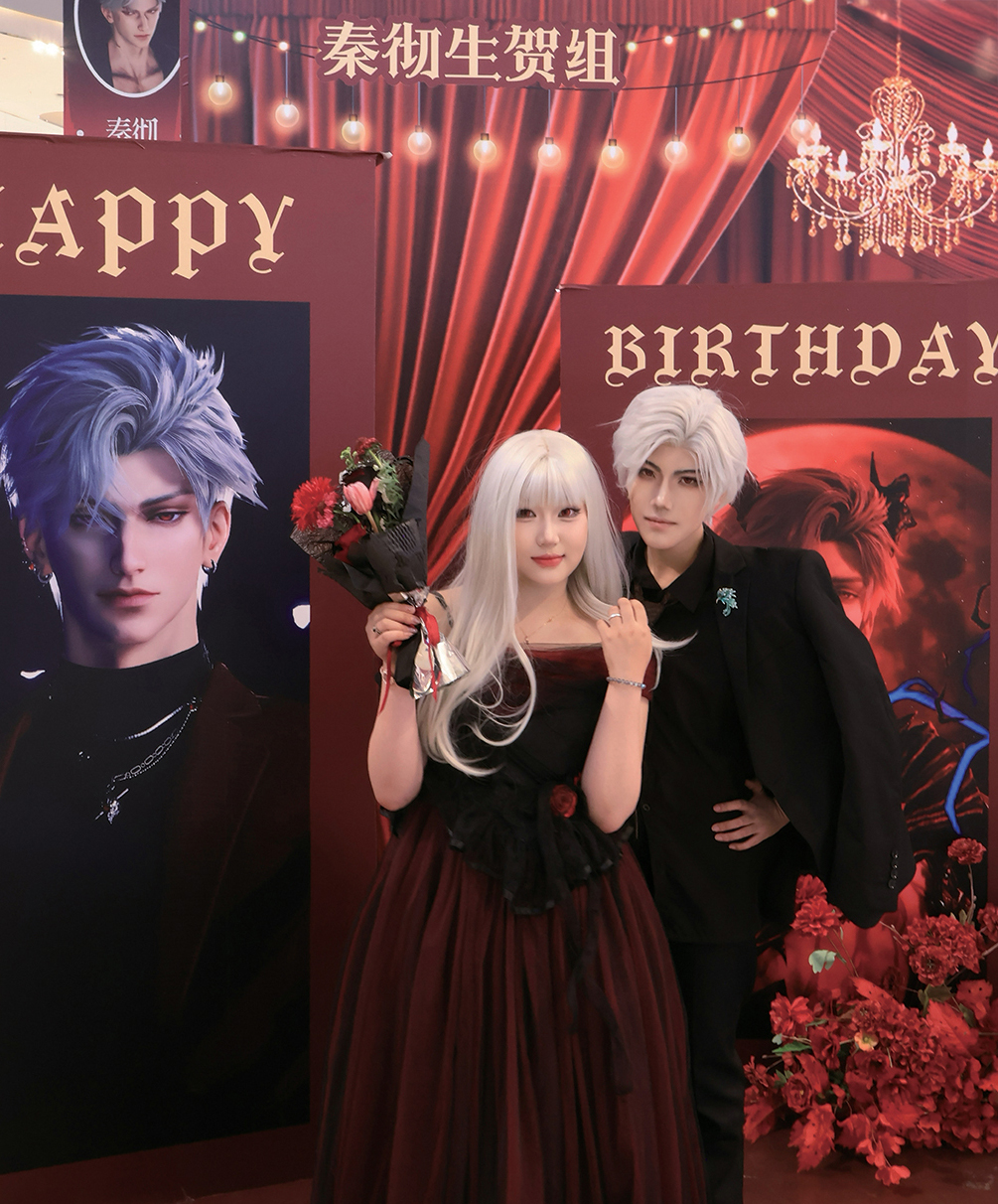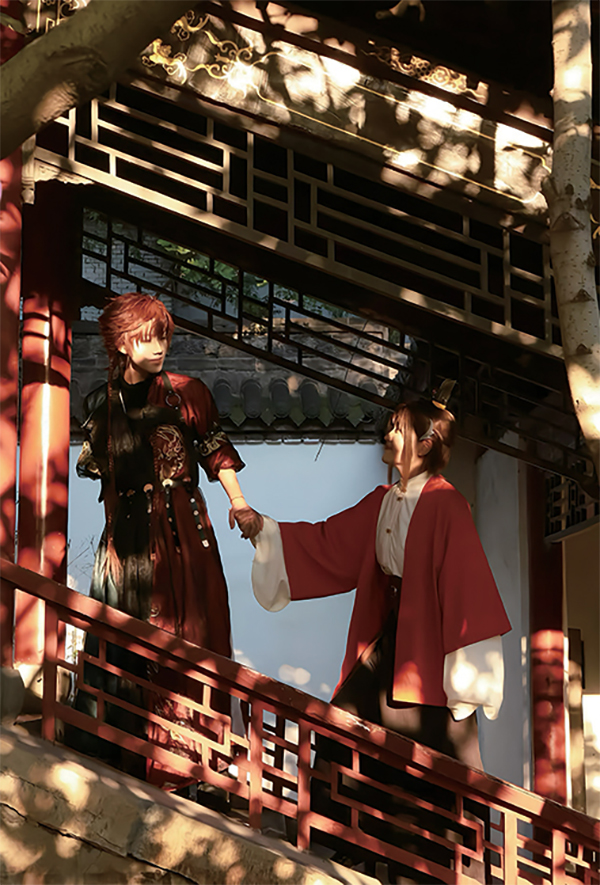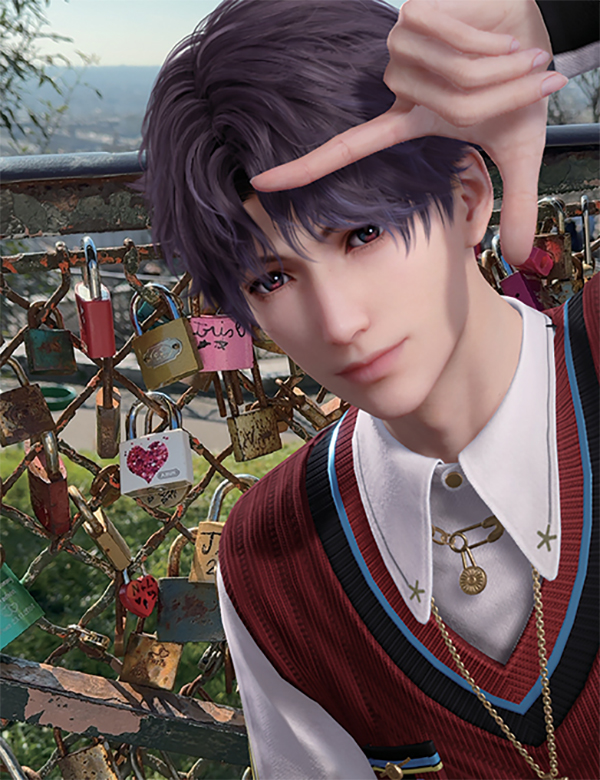For some, love isn't limited to reality — it blooms through games, cosplay, and journeys inspired by digital characters.

On March 1, Chai Qianwen, a 24-year-old from Nanjing, Jiangsu province, set off on a 10-day trip to France. She visited the Eiffel Tower, the Louvre, the coast of Nice, and the town of Menton — destinations carefully chosen to retrace the journey of Qi Yu, a character from the mobile game Love and Deepspace.
The trip was meticulously planned as a birthday celebration for her virtual lover — even though he exists only in the digital world.
Chai first discovered otome games — interactive romance games that originated in Japan and are primarily aimed at young women — in November 2024.
She was immediately drawn to the character Qi. Within two months, she had gone through the entire arc of a virtual relationship — from the initial acquaintance and awkward uncertainty to becoming a couple and falling deeply in love.
Now, their relationship has reached a stable phase: every morning, she opens the game to greet Qi on screen with a simple "Good morning".
China's first otome game, Mr Love: Queen's Choice, released in 2017, had already attracted over 2 million daily active players by 2018.
Its successor, Love and Deepspace, launched in January 2024 by the same company, quickly captivated players with 3D modeling and immersive gameplay. Players can unlock dating storylines by drawing cards and even trigger character reactions through interactive gestures, such as poking a character's cheek.
The game features five male protagonists, each with a unique identity and personality. For Chai, what makes Qi special is his "strong sense of being real". Rather than pursuing her overtly or aggressively, his gestures are subtly sweet, creating a sense of authenticity.

Qi is also the virtual boyfriend of Lin Aijin, a 23-yearold law graduate from Nanning, Guangxi Zhuang autonomous region.
Lin has been playing otome games for nearly 10 years and has tried almost all the well-known titles. Unlike most players, she doesn't focus on a single character; for her, different characters fulfill different emotional needs.
For example, Qi from Love and Deepspace provides her with the strongest "emotional intensity". Lu Chen from Light and Night has the greatest literary appeal and feels most connected to real life. Zuo Ran from Tears of Themis has a personality and values most closely aligned with her own.
For Lin, the male characters in otome games are a "source of energy", and her relationships with them rest on several core elements.
The first is companionship that never fades. "I really dislike goodbyes in real life. But the characters are always there when you open the game, no matter where you are or what time it is," Lin said.
The second is a safe space for emotional expression. "There are certain things in life you can't share with family or friends — often because they could lead to conflict. But you can always open the game and talk to the male characters," she explained.
Lin's connection to otome games goes beyond the screen. Her most memorable offline experience came when she commissioned a cosplayer to portray Qi at her university graduation.
The cosplayer stayed with her from afternoon until evening, taking photos, strolling around campus, walking the red carpet, and creating cherished memories.
"My cosplay commissioning wasn't a traditional date like most people have. What I wanted was for the character I love to be part of an important moment in my life," she emphasized.

Bridging two worlds
Cosplay commissioning often involves players of otome games who want to extend their relationship with in-game characters into real life. They hire cosplayers to play those roles and accompany them on offline "dates".
For safety reasons, almost all commissioned cosplayers are female.
Beimin (pseudonym), a 20-year-old student from Taiyuan, Shanxi province, is one of them. Since last year, she has taken on more than 20 commissions, portraying over five different male characters from otome games.
During a commission, cosplayers must fully "get into character". They take on the role of an ideal boyfriend — carrying bags, opening doors, giving flowers or small gifts — but more importantly, they need to capture the personality and aura of the character.
To create a convincing look, Beimin wears elevator shoes, a nose prosthetic, and heavy makeup, often enduring discomfort and fatigue.
Yet when she sees photos of herself perfectly transformed into the character, she feels a deep sense of joy and accomplishment. "It's like completing a successful performance. I can even see the affection in my own eyes during the commission," she said.
For her, what clients ultimately seek in commissioning services is emotional value. "Some need companionship, and others want guidance or encouragement," she explained.
One girl, for example, commissioned Beimin eight times in a single year. When they first met, the girl was very depressed. Beimin kept her company and listened to her, and eventually witnessed her personal growth.
"Perhaps at first, she saw the character I played as a form of spiritual support. But later, she began to develop her own pursuits and goals. In the end, cosplay commissioning became more like a bit of seasoning in her life," Beimin said.
She believes that clients seek the feeling of being loved while cosplayers find fulfillment in expressing love.
"I don't particularly yearn for a romantic relationship myself," she said. "What I enjoy is taking care of others. My satisfaction comes from seeing them benefit from my presence or genuinely feeling that I've looked after them."

Despite being immersed in virtual emotions, Lin has had romantic experiences in real life. She and her ex-boyfriend broke up due to issues involving long distance and differing life plans.
"Real-life relationships come with many practical challenges," Lin said. "After facing setbacks, returning to the two-dimensional world allows you to continue longing for ideal love."
Chai, on the other hand, has never had a boyfriend. "Even though the game is virtual, the energy and emotion I invest in it are real," she said, citing her trip to France as an example.
For Chai, love in the virtual and real worlds isn't all that different. The main distinction, she explained, is that "loving in the 2D world can feel easier because every character is highly idealized".
Love or substitute?
Some people believe that young people turn to otome games and cosplay commissioning as a "substitute for real-life love".
Beimin takes a more balanced view. Whether one chooses the "main course or the substitute" is fine, she said, as long as they are emotionally and financially mature.
At the same time, she warns against over-reliance. She sees herself as merely a dream maker — someone who strives to create the best experience but doesn't treat it as reality.
"I see cosplay commissioning more as a side job or a work of art," she said.
ALSO READ: Anime economy diversified momentum
Beimin often encourages her clients — all young girls — to focus less on the relationship itself and more on understanding what they truly want.
"Whether in real love or cosplay commissioning, being yourself is always the most important," she emphasized.
For Lin, virtual love isn't about substitution so much as the pursuit of beautiful emotions.
"Even if some girls say they no longer believe in love, the fact that they still play otome games shows that they do," she said. "Some people fear marriage and childbirth, but what they really fear is unhappiness."
Chai sees it the same way. "Even in today's digital age, people's basic need for connection and understanding hasn't changed," she explained.
She noted that before these games existed, her mother had been a fan of celebrities. "The feelings are the same; only the forms have evolved. People today are simply more open about these needs."
Chai believes her generation is fortunate to have so many ways to explore and experience what they desire. She isn't sure how long she will keep playing, but for now, she plans to continue her virtual relationship with Qi.
Contact the writer at guiqian@i21st.cn


